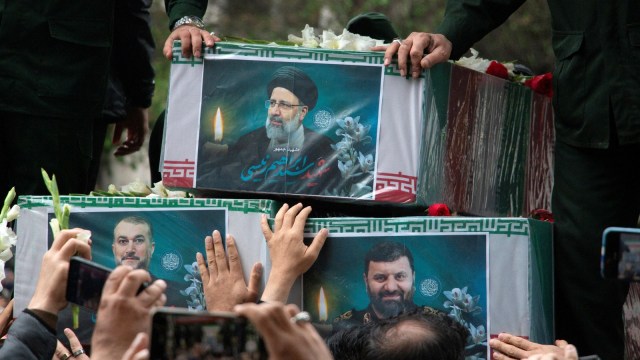
The mysterious death of Ebrahim Raisi, President of the Islamic Republic of Iran, in a helicopter crash along with his foreign minister Hossein Amir-Abdollahian adds to the question of the power struggle. The main question on the minds of most analysts and observers of Iran is whether Raisi’s sudden death will create any changes or new opportunities in the substitution process of the 85-year-old Supreme Leader, Ayatollah Ali Khamenei.
Though conservative hardliners dominate all branches of power, Raisi’s death will create trouble for them. They will have to find a new candidate among the veterans of the Islamic regime who can be both a unifying figure and loyal to the Supreme Leader.
Raisi’s commitment to the political principles of the Islamic regime and its use of violence was well known. Let us not forget that Raisi was a former prosecutor who played a decisive role in the mass execution of political prisoners in the 1980s. In 1988, he was appointed to a four-man “death commission” by the late Ayatollah Khomeini, which led to the execution of at least 5,000 prisoners. Despite his role in the consolidation of the Iranian judiciary in the past four decades, Raisi’s accession to the presidency was marked not only by the systematic exclusion of moderate and pro-reform rivals but also by a record low turnout of voters. Therefore, Raisi’s election in 2021 was carefully engineered and controlled by Khamenei and the Iranian Revolutionary Guards (IRGC), who have been influencing all decision-making concerning Iranian domestic and foreign policies.
There were rumours that the best candidate to replace the Supreme Leader of the Iranian revolution would be Ebrahim Raisi. This choice had the approval of hardline members of the IRGC and the Basij. They form the most powerful support base for exporting the Islamic revolution to other countries and breaking all resistance from social and political groups inside the country. Raisi’s presidency was an important opportunity for Iranian hardliners to win control of the most important branches of government.
As for Raisi himself, though he succeeded in reunifying most conservatives in the regime, he failed to energise Iran’s disaffected population. He was far from being a maverick figure who could garner support from the largest segment of society — young and disillusioned Iranians. His election as president was exactly the sort of outcome that Khamenei’s pre-election engineering aimed to achieve. However, Raisi’s election brought him under fire for political incompetence and economic mismanagement. Critics blamed him for failing to contain dissidence and demonstrations of young women and students following the death of Mahsa Amini in September 2022.
In the last three years, Raisi’s presidency was marked by numerous human rights violations, including persecution of religious and ethnic minorities, mass arrests of nonviolent demonstrators and increasing use of the death penalty. One can also add that Raisi’s Iran provided the IRGC with an authoritarian push to nurture the regime’s all-encompassing Shi’a Islamist ideology across every aspect of Iranian society and in the Middle East. This, of course, simply meant a return to the core values of the Iranian revolution at home and a more zealous commitment to regional militancy and militarisation. Raisi was less successful and effective than his predecessor, Hassan Rouhani, in making progress over the nuclear issue with US President Joe Biden’s administration.
In sum, Raisi was not someone who could manage political complexity. Now that he is out of the picture, those who helped him to get elected will try to advance without him. But the void created by his death cannot be easily filled, especially because Khamenei’s health is becoming more fragile every day and international and domestic conditions are working against the Iranian government. The truth is that the Raisi government was unable to relieve the pressures faced by the Supreme Leader, who has been trying to ensure a smooth transfer of power to his second son, Mojtaba.
Now that Raisi is out of the picture, the Supreme Leader’s succession plans are more tangled than ever. Yet, Raisi’s death opens the door to the ambitions of the most powerful economic, political, and military institution in Iran, the IRGC. The IRGC was initially charged with protecting the revolution and its achievements. However, the guards used their constitutionally mandated roles to legitimise their power and extend political influence. As they accumulated more power and influence, the boundaries of their power have blurred. The current moment provides an avenue for the IRGC to accumulate more power and influence, within Iran and beyond.
On the economic front, the IRGC has gained absolute control of all state contracts and investments, including oil and Iran’s imports and exports. At the political level, the Revolutionary Guards entrenched themselves in the internal political affairs of the Iranian state, arresting, imprisoning and killing individuals that they considered dangerous and subversive for their own survival. Last, but not least, the military capabilities of the IRGC turned out to be so extensive that they became a serious threat to the leadership of the Ayatollahs.
With Ayatollah Khamenei becoming more and more dependent on the IRGC for his survival, post-Raisi Iran will look more militarised and less theological. As a result, the clerical establishment in Qom could find itself in an open confrontation with the Revolutionary Guards. When and where this confrontation unfolds is not important, since the likely beneficiaries of this struggle, one way or another, will be the IRGC.
The writer is Director, Mahatma Gandhi Centre for Nonviolence and Peace at OP Jindal Global University
© The Indian Express Pvt Ltd
First uploaded on: 21-05-2024 at 15:24 IST


